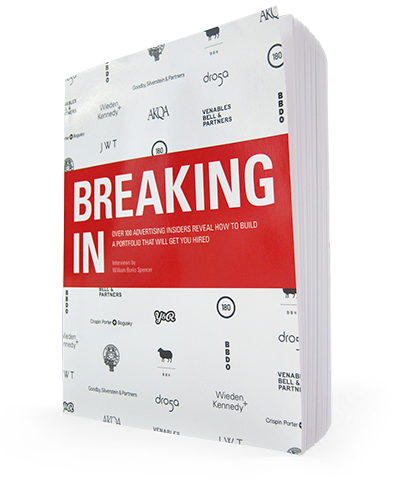Check out some great work from Steve McElligott.
WS: What do you look for in a student book? And what impresses you?
SM: It’s a tough question. I think I look for—and this sounds cheesy—but I look for passion. It does sound really, really trite. But you can tell the difference between somebody who is just following the routine from their ad school and just doing assignments, and somebody who really, really, really has the hunger, and really has a deeper understanding of what they’re doing and why. And I think that comes through really quickly with anyone who cares, and for the other people who are just sort of filling in the blanks.
WS: How do you think it comes through?
SM: Good question.
WS: Maybe that’s a hard question.
SM: I don’t know. I think it’s one of those things you can’t put your finger on, honestly. Like, you know it when you see it, and you don’t see it very often, which is why you know it. Because I think there’s so few people out there -— it’s really 1 in a 100. I see a lot of books. They always shuffle them to me. And this kid came in about three months ago. And his book was so clearly apart from everybody else’s. And I talked to him for five minutes, and I instantly knew this guy was going to be a smash hit. And it wasn’t because he was just finishing assignments for some teacher somewhere. It was because he really gave a fuck.
WS: Do you think that sketches can be enough to get into the business, if the ideas are good enough?
SM: I don’t think they can. I don’t think so anymore. I think things need to be really polished. I’d hate to say that. There’s always that story about…you know who Jeff Kling is?
WS: Yeah.
SM: Did you ever see his book?
WS: Yeah.
SM: I think it’s up there in one of those One Show [annuals]. Like “That’s so fucking great!” that there was a time when you could do that. But I don’t think you can anymore. I think it needs to be really buttoned down. There’s so much competition.
WS: Do you want to see long copy?
SM: Yeah, I definitely do. I think there’s a real dearth of people who can really write. And I think writing is so important. Not just for the ads, but if I’m going to hire somebody…people who can’t write, can’t communicate—they suck. And they’re all over the place. There’s all these writers in this business who really don’t know how to write. They can’t craft a sentence. And, it comes through in more than just the ads. It comes through in how they present work to the clients, and how they communicate with people, how they present work to you, and how you read their work. So, to me, it really matters. I don’t care what anyone else says. People say “long copy is dead.” Well, big deal. If you’re not going to show me long-copy ads, show me a great piece of writing. But to me, it’s fundamental and critical.
For art directors, it’s not as much. I could take it or leave it, to be honest. I’d like to see long-copy ad, just to see what they can do with it. But I don’t really care. But even with an art director, I’d love to see if they can write. What surprises me is that, even at this level, after being in this business for 10 years, I’m surrounded right now with people who aren’t able to communicate through writing. And it just blows. And it’s horrible. I would never hire anybody without knowing that they can actually…at least that they can craft an email.
WS: You mentioned writing that’s not ads—short stories. What do you think about putting things that aren’t ads like that into a book?
SM: I think it’s great if it’s edited wisely. I remember this kid who came to me, and he had an okay book—he was a writer—but it didn’t show that he had writing skill. And so I suggested to him that he go find something, dig up something, pick something out from before, or come back with something new, or whatever. And so he went in, and he clearly just went into his computer files, and just found things that he had written, like, these random emails, and his letters to friends, and it was so messed up. Because one, I didn’t care about all this stuff, and two, they weren’t well written. But I really think it’s great to have anything you can to support your work…and also show what your personality is. But, that said, your personality should come through really clearly in your book. And I think, only in about one percent of books are you actually able to read somebody’s personality. But when I look at a book, it should be like a dinner conversation. It should be, when I walk away half an hour later, I’ve got a pretty good feeling for this person.
WS: So you want their voice to come through in the ads.
SM: I want it to come through really clearly. I just don’t want it to come through, I want it to shout through. It doesn’t mean it has to be a loud voice to shout through.
WS: But, it’s a balance right? Because you also want them to be able to take on different voices, appropriate to each brand…
SM: Yeah, definitely, but I think no matter what brand you’re working on, your voice will come through. I think one of the problems with ad schools today is that they’re such factories that a lot of students really lose their voice. Or maybe they just never find it. But I don’t feel like I see a lot of the person coming through in any books I see, ever.


Comments are closed.